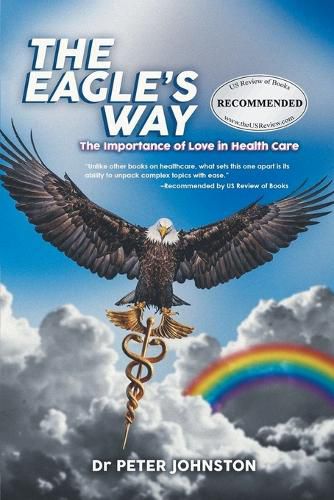Readings Newsletter
Become a Readings Member to make your shopping experience even easier.
Sign in or sign up for free!
You’re not far away from qualifying for FREE standard shipping within Australia
You’ve qualified for FREE standard shipping within Australia
The cart is loading…






This title is printed to order. This book may have been self-published. If so, we cannot guarantee the quality of the content. In the main most books will have gone through the editing process however some may not. We therefore suggest that you be aware of this before ordering this book. If in doubt check either the author or publisher’s details as we are unable to accept any returns unless they are faulty. Please contact us if you have any questions.
In the Eagle's Way: The Importance of Love in Healthcare, the author, a general practitioner, looks back at the changes he has seen over fifty years of study and practice of medicine. Remarkable advances in medicine and surgery have been accompanied by the growth of alternative medicine. He sees the emergence of holistic/integrative medicine as an important development in the evolution of healthcare. In this guide, he explores the principles and philosophies of alternative medicine and its complementary relationship with traditional medicine.
The underlying principle of orthodox medicine is fighting disease; in contrast, the underlying principle of alternative medicine is embracing disease, an approach consistent with the new paradigm of unity. Both principles are varied yet powerful. He believes that maintenance of scientific standards dictates that most alternative therapies will remain outside the parameters of orthodox medicine but will be complementary to it.
Conventional medicine is intellectual, sensory, head-based, and extraverted in its approach, whereas alternative medicine, especially the new psychotherapies, tends to be intuitive, heartbased, and introverted. The latter tends to go with the flow rather than have set standards of treatment. Practitioners of holistic and integrative medicine using both systems are often viewed as the healers of the future. While both systems can offer help to the patient, the most powerful force in healing remains unconditional love in the form of nonjudgmental respect, care, trust, and compassion. Dr. Johnston presents this as the central core of holistic and integrative medicine in The Eagle's Way.
$9.00 standard shipping within Australia
FREE standard shipping within Australia for orders over $100.00
Express & International shipping calculated at checkout
This title is printed to order. This book may have been self-published. If so, we cannot guarantee the quality of the content. In the main most books will have gone through the editing process however some may not. We therefore suggest that you be aware of this before ordering this book. If in doubt check either the author or publisher’s details as we are unable to accept any returns unless they are faulty. Please contact us if you have any questions.
In the Eagle's Way: The Importance of Love in Healthcare, the author, a general practitioner, looks back at the changes he has seen over fifty years of study and practice of medicine. Remarkable advances in medicine and surgery have been accompanied by the growth of alternative medicine. He sees the emergence of holistic/integrative medicine as an important development in the evolution of healthcare. In this guide, he explores the principles and philosophies of alternative medicine and its complementary relationship with traditional medicine.
The underlying principle of orthodox medicine is fighting disease; in contrast, the underlying principle of alternative medicine is embracing disease, an approach consistent with the new paradigm of unity. Both principles are varied yet powerful. He believes that maintenance of scientific standards dictates that most alternative therapies will remain outside the parameters of orthodox medicine but will be complementary to it.
Conventional medicine is intellectual, sensory, head-based, and extraverted in its approach, whereas alternative medicine, especially the new psychotherapies, tends to be intuitive, heartbased, and introverted. The latter tends to go with the flow rather than have set standards of treatment. Practitioners of holistic and integrative medicine using both systems are often viewed as the healers of the future. While both systems can offer help to the patient, the most powerful force in healing remains unconditional love in the form of nonjudgmental respect, care, trust, and compassion. Dr. Johnston presents this as the central core of holistic and integrative medicine in The Eagle's Way.